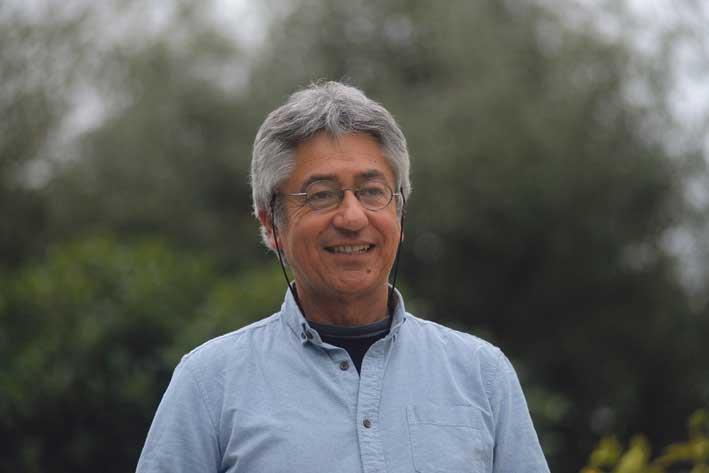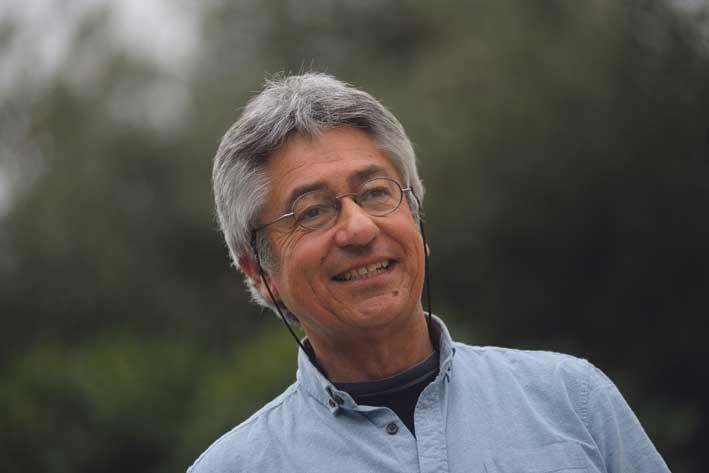The English as a Foreign Language (EFL) teaching industry has been a booming one in Malta for decades now. Mathias Mallia spoke to Alan Marsh, a notable figure in the world of EFL to find out more about the EFL world in general and the current situation in the Maltese EFL system. Mr Marsh also reconsidered predictions he had made in 2000 about the industry and gave a little more insight into what we are to expect in the coming years.
Alan Marsh, despite all his different positions and responsibilities in the EFL world to date, still considers himself first and foremost a teacher. “I have always loved teaching and I’ve always been interested in finding out more about teaching.”
Being half British and half Maltese, he spoke of being culturally both here and there. Mr Marsh moved to Malta “in 1993 because I was asked to help set up teacher training here for Cambridge; to set up a centre around CELTA courses. It was actually Louis Grech, the Head of NSTS, and he asked me if I’d be interested in coming to work and I’d said, ‘Yeah’.
“Well after talking to my girlfriend at the time, who is now my wife, we said yes. It was an opportunity to come to Malta and we considered it so we accepted. I thought it was for four years, but I’m still here. I’m actually 61 now so I was around 40 when I came here.”

Before settling in Malta, he worked in Italy for 14 years, 12 of which with a major organisation called International House. “Now, in the EFL field in Europe, International House is largely seen as leaders in teacher training and development. It is an affiliation of about 200 schools. Why I’m mentioning them is because I think I grew up in International House. Many of the things I do and many of the things I learnt and the impetus came from working in this very creative organisation.”
We still don’t know how people learn languages
Having read for a Degree in English at the University of Malta as a youth, Mr Marsh has always been interested in languages, English in particular. “One of the interesting things is really that we still don’t know how people learn languages. There’s a lot of research out there and we have a fairly good idea but, in our field over the last 100 years, there’s been so much experimentation.”
When asked about what has kept him excited about the field, as is evident by the ever-present spark in the seasoned teacher’s eyes, he replied that he doesn’t actually know what drives him. “I think it’s the field itself; it is an exciting field if you want to get into it at that level. It’s more than just a salaried job; it’s something exciting within itself. There is a lot that we do in modern language teaching that also goes beyond language teaching because it is largely learner-centred.
“We are fostering and encouraging communication between different cultures and we are challenging mindsets where the teacher is the be all and end all and, by extension any authority. In a way, it’s also empowering people and perhaps contributing to making some people a little bit more open and democratic and for me that is one of the most exciting things we do.”

Co-operative schools
Mr Marsh found it very difficult to name one particular experience which would stay with him throughout his life, apart from meeting his wife who was also a teacher in the same school, of course. However one experience which served as a “formative one”, in his words, was working for a cooperative school; a concept which most in the field find hard to grasp. “I worked in a school where the teachers owned the school. I worked there for 12 years and it was a cooperative and all the people who worked there were members of the cooperative. So we elected our Director of Studies (DOS) and, by policy, we changed the DOS every three years. You couldn’t stand for a second term immediately afterwards.
“We had our budgets, we knew what the income was, we made all the decisions in terms of training, development and where it was all going, we made three-year plans and that really helped give us all an overview of everything and actually helped us to work a lot. Within our organization we were viewed from afar as innovative, creative and slightly whacky. ‘You change the Director of Studies?’ ‘Yeah, yeah.’ ‘But who’s the boss?’ ‘There isn’t one.’ I was actually elected as president of the cooperative which meant basically I was legally responsible but again we were all elected every three years. I think working in that environment taught me a lot.”
His greatest achievement in the field in Malta is his work with MATEFL, “an organisation which has created a space for teachers to come together, share their ideas and learn from each other. I think that my involvement in its development over the last 21 years is my most important contribution to the EFL industry in Malta, followed by my work on Cambridge Celta and Delta courses here.”

Cultures
Mr Marsh was also asked about challenges in terms of varying cultures in a class and how he handles them. “Whenever there’s been a potential issue, as soon as we’ve started, I’ve sat down with people and talked about it. I remember once teaching a group of Iranian students and Iraqi students and their countries had just gone to war.
“We sat down and talked about what the issues were outside the classroom. Inside the classroom they were individual learners and our job is to improve their English as much as possible and let’s agree to leave that world outside. Often if you name the issue and address it, any potential difficulties are dealt with and you can go from there.”
Current situation in Malta
The Malta Independent was informed that there have been a number of changes within the internal structures of the EFL industry headed by the ELT Council. Some of the changes led to certain points of contention within professionals in the field and the newsroom wanted Mr Marsh’s input on the issues raised by his peers.
One issue is now having to pay to renew the teaching permit which was previously free. “I’ll be honest, what they’re being asked to do is pay 20 euro for a permit that lasts four years, so that 5 euro per year. I don’t think that’s very much, I mean how many cups of coffee is that? I think the problem here is for a lot of teachers who are not in contact with the council; it all came as a bit of a shock.
“It could have been dealt with if perhaps things had been addressed in a different way. Maybe it could have been discussed as a potential issue with teachers themselves. Perhaps also instead of saying ‘as from now’, saying ‘as from January 2017’. I think a little bit of forewarning and spending time with teachers would pay off in a big way. I think a lot of the discontent at the moment that’s out there could have been pre-empted.”

Mr Marsh also mentioned that, although he isn’t part of the ELT Council, he is very aware that they are on a very tight budget and that “they do a lot of good work” so in the end he conceded that “funds need to come from somewhere and the government can’t give a large amount of money to such a body. I can understand their need for some kind of income and, I repeat, I don’t think it is too much.”
Another change which has been implemented after years of discussion was a minimum amount of hours of training per year which need to be done in accordance with specific guidelines published by the ELT Council. “Some schools are taking it upon themselves to offer that training free of charge to their teachers. Others can’t perhaps because they don’t have the resources because of their size and for other reasons and so people until now have been asked to pay for that as well.
“I think there is an even more important issue is this, and I feel quite strongly about this. If you want to become a teacher then you have to do an amount of training. Schools should make that a kind of requirement. Beyond that, I wonder if the entire notion of “imposed development” has any impact because if teachers are forced to do it just to fill up a certain amount of hours, how much of that are they really engaging with? I’m not sure how effective that kind of development is.”

Predictions made in 2000
In 2000 during an online interview, Mr Marsh made a number of predictions for the following years in terms of EFL in Malta. TMI quoted him and wanted to see if, according to him, they had come true. With a smile and a very British sounding, “Oh dear!” he was surprised at how accurate he was.
He had predicted that learners would ‘become increasingly demanding about the product they are buying’. Was this prediction sound? “Yes and I believe that schools have responded to it as well. I remember when I first arrived in Malta and worked in a leading language school, there were no course books. They had their own in-house material, but there was very little awareness of what was out there. Technology was largely absent.
“Schools now have gone into markets which are largely a lot more technological. Now students are also a lot more aware of the product and there is a lot on offer. They look for things like differentiation of levels and teacher qualifications and now they ask these questions a lot more than they used to.”
He also predicted ‘an increased demand for younger learner courses (8-14)’. “I think at the top end of that scale, that’s beginning to happen. The big market in Europe is the younger students and Malta’s challenge, if they want to have parents sending eight-year-olds and nine-year-olds, is to have places that are safe.
“I think for younger learners, what’s really important is that there are people who are trained to take care of them outside the classroom, who have recognized qualifications. The second thing is that, to teach younger learners, teachers need to be specially trained and chucking somebody in without special training could be very counter-productive”
Future predictions
Mr Marsh concluded the interview by giving one further prediction, and one thing which he hoped he would be right about in the future. “More technology driven learning and the emphasis won’t be so much on teaching, but more on facilitated learning as well.
“Interestingly, what will happen that as learners have more access to online resources, the actual role of teaching will become even less teacher-centred than it is and what we will be training people to do is to be autonomous learners of English. Maybe with face to face sessions or even over Skype and I think we will be doing a lot of that over the next few years.”
“I would like to see, in Malta, people choosing EFL as a career. I would like to see teachers being attracted to EFL because it is intrinsically interesting and exciting but also because it offers a career which will allow them to develop and also to have a decent life as well. That’s what I would like to see. More of that.”